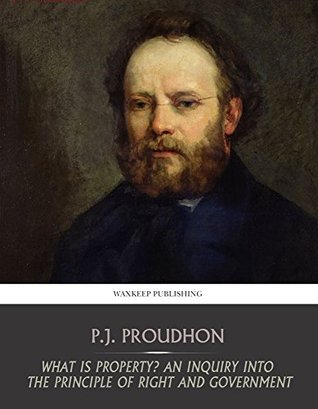What do you think?
Rate this book


What Is Property? An Inquiry into the Principle of Right and Government is one of Proudhon's classic works on anarchism and mutualism. A table of contents is included.
233 pages, Kindle Edition
First published January 1, 1840
Here's a little secret: We don't actually find out what Proudhon means by property until page 118 of this translation, where it says, "Property is the right of increase [aubane] claimed by the proprietor over anything he has marked as his own." We can think of property as a bundle of distinct rights including 1) the right to occupy (as a house or plot of land); 2) the right to use; 3) the right to exclude others; 4) the right to transfer other rights by sale or gift; and 5) the right to profit from use or transfer. Note that although I retain rights 1 through 4 over my house, and can profit from selling it, I live in a residential zoned neighborhood, and cannot derive profit by using it to run certain types of business.
When Proudhon says "Property is theft," he is actually objecting to certain versions of the right to profit, and not to the other elements of typical property rights.
Personally, I found the last chapter to be the most interesting one. Here, Proudhon develops a naturalistic account of human psychology that is continuous with what we observe among other vertebrate species. Much of Proudhon's earlier arguments are couched within the assumptions of classical economic theory. Classical theorists searched for the mojo that both creates value and serves as the criterion for fair exchange. There were many candidates, and Proudhon reviews several of them: possession, labor, soil fertility... His point is that none of them justify a proprietor's right to profit from use. But it's hard to square any of these arguments with contemporary economics because economists gave up the search for mojo sometime in the last half of the 19th century and developed a theory of exchange relations based on the facts of scarcity and demand. Most don't claim this is morally justified, only that it explains how markets work.
You would have to have a certain taste for the history of ideas to enjoy reading this book, but I have it, and I did. My two star rating reflects my judgment that readers will have a hard time making sense of the book if they don't have some prior familiarity with the history of economic thought.